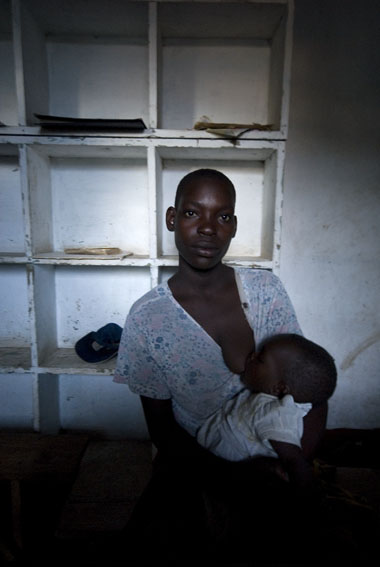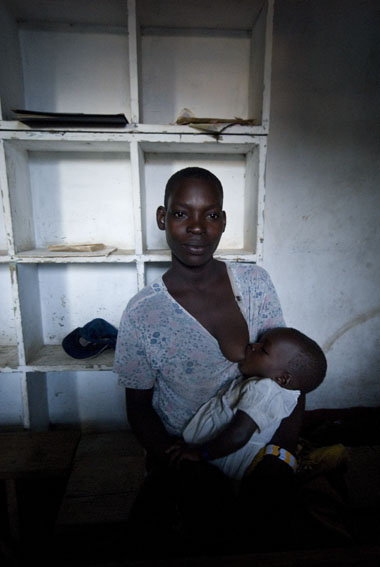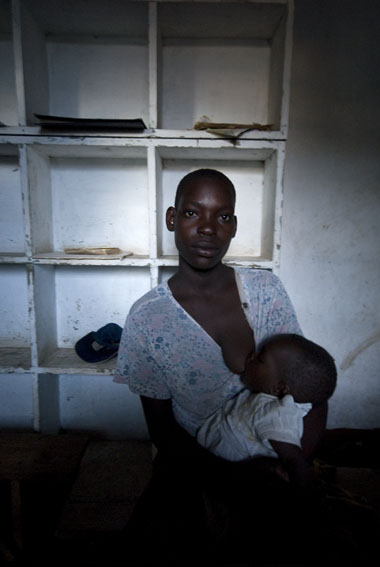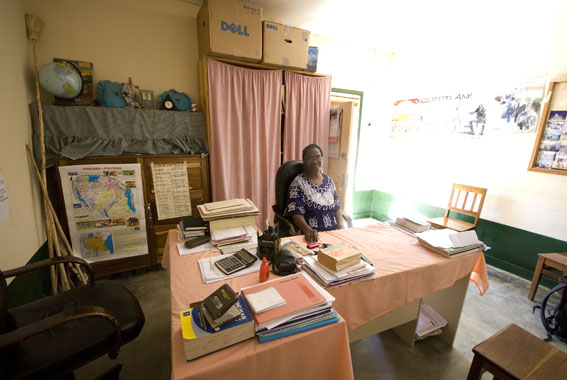http://www.ipsnews.net/africa/nota.asp?idnews=49659
Running away from home; Mara girls escaping FGM
MUSOMA, Tanzania
01.12.09
In the darkest corner of the room, under the clamour of 12 women’s voices, sits Ghati Chacha, she can barely be heard. Her newest born suckles on one of her breasts as she tries to speak about how she refused female circumcision.
“I refused because (the previous) President Mkapa had banned circumcision in Tanzania,” she said. After this, however, Chacha was forced to marry an 80-year-old man because, according to the local customs of the Kurya tribe in the Mara district of northern Tanzania, she was no longer suitable for a man of her own age.
“I was forced to be married by my father,” she said. “I tried to refuse but my father ordered me to leave home. He was paid only 12 cows for my marriage.”
It is made obvious that Chacha is the only one in the room who is uncircumcised and her story gets cut off as the other women in the room shout to be heard.
“The young men laugh at each other if they marry an uncircumcised woman,” said Mondesta Mugaya, a 65-year-old woman, who used to perform circumcision in Kitarmanka Village in the Musoma rural district.
“And the uncircumcised girls are still considered to be children,” she said. “At traditional ceremonies uncircumcised women aren’t allowed to be there.
“I don’t believe in circumcision for girls anymore, but without it girls sleep around a lot.”
Female Genital Mutilation is seriously dangerous; it is usually performed without anaesthesia on girls anywhere from infancy and up. The conditions are often unhygienic and the tools can be razor blades, knives or even teeth, (one woman told me).
The procedure can cause severe bleeding and problems urinating, and later, potential childbirth difficulties and newborn deaths. According to the World Health Organisation an estimated 100 to 140 million girls and women worldwide are currently living with the consequences of FGM. And in Africa, about three million girls are at risk for FGM annually.
—
In Mama Regina’s office at the Catholic Diocese of Musoma Bhoke Mwita* is smiling. She’s sitting on a wooden chair swinging her legs and fiddling with her mobile phone. In 2004 she and her two children found refuge here.
“My husband died in 2003,” she said, “and I was supposed to be inherited by my husband’s brother, but I refused. I said I needed time to think about it. Then I ran away.”
It was Mama Regina Andrew who, not long after she had started an FGM campaign with the diocese, found Mwita in her village seeking help. As the assistant for the Women in Development (WID) program Mama Regina has helped 36 girls escape from FGM, and another 90 women from problems like domestic abuse and forced marriage.
“It is one of the biggest ceremonies in Kurya tradition,” said Mama Regina. “Some 95 percent of girls are still being circumcised in the Tarime District.
“The law is against FGM, but we don’t know how the government is dealing with these issues,” she said.
The tradition is deeply embedded in some cultures, such as the Kuryas’, and according to the Diocese it has only been in the past 10 years perceptions have started to change.
Mama Regina and some Sisters regularly visit villages to hold public meetings and events, they also initiate working groups to provide information about women and children’s rights, particularly the effects of FGM.
“It wasn’t an easy task,” she said, “because women are seen as not the same as men, not as important. The women do a lot of work, at home, in the farm, with the children, but it is the men who are the beneficiaries.”
“You see; girls are seen as income generating for the family,” said Mama Regina. “Parents don’t see the reason to send girls to school because they won’t receive the dowry when the girl is married. They think it will make the family poor.” (Perhaps because they may marry in a non-traditional way outside of the village, where cows bare no relevance or because they want their money or cows or damn dowry if they please it.)
—
Mwita was 18 when she was circumcised and tells me about the ceremony.
“First they set the date, where around 100 girls will be circumcised together. You don’t sleep the day before while they are preparing you. There is a lot of celebration, drumming and food. On the day you’re not allowed to eat or drink because maybe you’ll urinate or something during the process.
“Everyone is singing, trying to make you happy. You reach the special place and all the girls are sitting on kangas (cotton material commonly used for skirts) lined up. Everyone from the community is there, men, boys, women, and children. The older women collect money from the community before they start.
“So you wait your turn.
“When it was my turn, I felt extreme pain, but you’re not allowed to cry. If you do, they will beat you and leave you there.
“I bled a lot and fell down, but didn’t cry.
“It takes three to six weeks to heal, and after the circumcision you are considered a real woman who is ready to be married.”
“After circumcision I actually felt less of woman,” said Mwita, “because the system has been disturbed, I didn’t feel like a woman at all.
“If girls die during the circumcision, which happens a lot, then they won’t be buried at home. They will get thrown into the bushes and eaten by hyenas. It’s considered a curse, a spell (to not survive circumcision), so all their belongings have to be removed from the house, in order to get rid of the curse.”
—
Mama Regina believes that for the Kurya FGM will take many years to stop. “It’s a kind of religion,” she said. But this belief doesn’t stop her and the Diocese from fighting for girls and women’s rights in the Mara region.
“We started the big FGM refugee camp just out of town here as a place for the girls to get counselled, as well as somewhere for them to run to when they escape from their communities,” she said.
“When the girls go back to their communities they say ‘Thank you for this tradition, because I fled, and now I’m educated’. The families see them speaking with confidence, without fear and this helps them realise the importance of stopping FGM.
“I believe that it will take time to change, but one day soon it will be a shame to be circumcised.”
According to Mama Regina when Mwita arrived at the diocese she was very thin, very nervous and softly spoken. Now, said Mama Regina, she has gained a lot of confidence, strength, and weight, and is completing secondary school.
Through the WID program, Mwita herself now runs micro-finance programs for women in villages to start businesses such as farming, bakeries and clothing shops. She also speaks at public forums and educates about the effects of FGM.
“When I go back to my village,” said Mwita, “people respect me and they are cautious about what they say to me. But it is like bringing Western values in, and I am aware of the difference.
“Life is different for me now, it’s better to be here (in town) than in the village. Now I am strong, unafraid, and can fight for my rights.”
*Not her real name



